The bright, young urbanist econo-bloggers jumped on his case: Ezra Klein, Felix Salmon, twice. Even Paul Krugman, not so young, piled on. Not to mention actual New York City bicycle activists.
It's pretty obvious that Cassidy wrote himself into the wrong end of a cultural shift, something like another one many of us have lived through: when I was a kid, I thought it completely normal that my parents lit up cigarettes at the dinner table. As a consequence, they couldn't very well object when I did the same beginning at about age 14. When I went away to college, I flew in the smoking section of the plane. By the time I left college, some people around me were trying hard not to smoke. Eventually I kicked myself; it is after all a nasty, smelly, unhealthy habit. Down the line, I saw San Francisco bar smoking in restaurants, later bars, eventually in offices, and now even near the doors of such places. Every step met impassioned opposition -- every step has come to seem simply normal. I'm stunned and a little offended when I find myself in locales where smoking is still legal. Smoking has become such a transgressive activity in my world that young people are taking it up again to show off their individuality. Let's hope too many don't die of that indulgence, but that's what people do.
All this is a long introduction to reporting that my household, and in particular my partner, is living with one of the literal injuries that happen in the middle of cultural changes. She's a proud bicycle commuter. For the last couple of years, she has ridden across town to work, uphill and down, in full sun, some rain, and twilight. But ten days ago she lost her gamble on the good behavior of people driving 4000 pound metal cylinders. She broke her wrist while avoiding a crash with an SUV that cut her off.
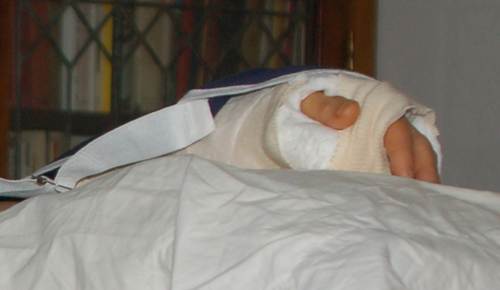
I, on the other hand, am simply too cowardly to ride in the city. I feel sad about that, but not enough to risk it. There are enough other hazards in life ...
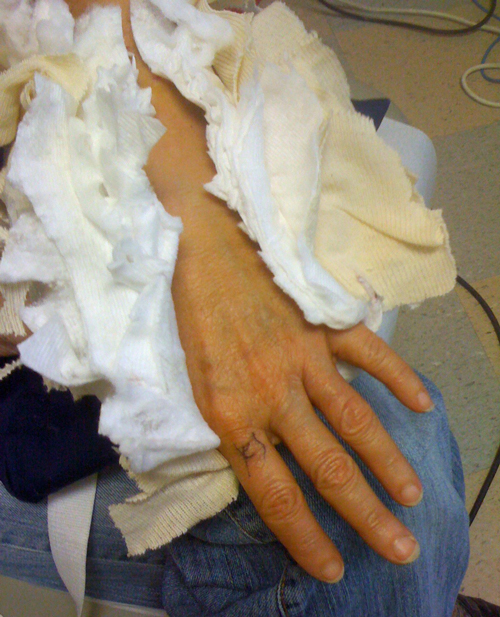
Nowadays casts come off quickly -- at one week after surgery to repair the break in this case. Note the care with which the surgical team wrote "YES" on the appendage needing the work.
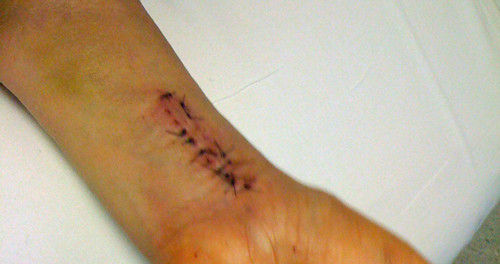
That incision will probably leave a bit of a scar.
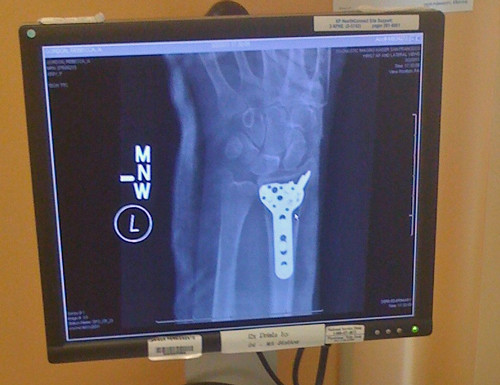
Got to love having your doctor be able to project your xrays for you. That's the permanent plate that will ensure the bone grows back as close to the same shape as possible.
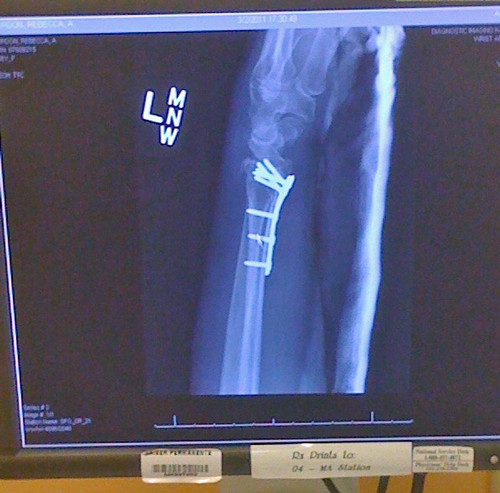
It takes a lot of screws to hold a wrist together. Though the plate is permanent, eventually it will be embedded in regrown bone.
I look forward to the day when the cultural shift toward coexistence between bikes and cars in cities is more complete. At that point, cycling will be less dangerous. To get enough cyclists out there so that the bikes are just part of the urban landscape, you need dedicated lanes most everywhere people want or need to go. The bike lanes need to connect to one another, not just hang out there as isolated strips of relative safety. And folks have to get used to the idea that riding is simply easier and less hassle than driving and parking.
I've seen this work in Amsterdam. San Francisco is small enough so it could work here. The obstacles aren't moral; they are practical. More of us could live here in a healthier, more sustainable way if we made the city more bike-friendly. The idea of reaching "critical mass" is not a slogan; it is real. But we have to work our way through the likes of Mr. Cassidy, folks who simply don't (yet) imagine the possibility of this change.
No comments:
Post a Comment